Corporate Governance
The Tamura Group is enhancing corporate governance through management to help maximize corporate value.
- Basic Views on Corporate Governance
- History of Corporate Governance Enhancement
- Corporate Governance Framework
- Nomination of Director Candidates
- Effectiveness Evaluation of Board of Directors
- Effectiveness evaluation of the Board of Directors
- Compensation of Director Remuneration
- Strategically held shares
- IR Communication
- Basic Policy for Internal Control Systems
Basic Views on Corporate Governance
The Tamura Group's basic management philosophy is to view shareholders and other stakeholders with importance. Management team, entrusted by shareholders to manage the Company, has a strong sense of mission and a high sense of corporate ethics, and aims to promote compliance and maximize corporate value by improving management efficiency and transparency. We believe that corporate governance serves as the foundation that helps with these initiatives.
History of Corporate Governance Enhancement
Since introducing outside directors in 2002, we have worked to increase our ratio of outside directors. In addition, we introduced an executive officer system in 2005 to separate supervision and execution roles so that the Board of Directors can perform its functions more effectively.
In June 2023, we transitioned to being a company with an Audit & Supervisory Committee with the aim of further improving governance. The CXO system was also introduced in July 2023. In order to increase corporate value, we are promoting initiatives in both the enhancement of the supervisory system of the Board of Directors and the strengthening of the executive system.
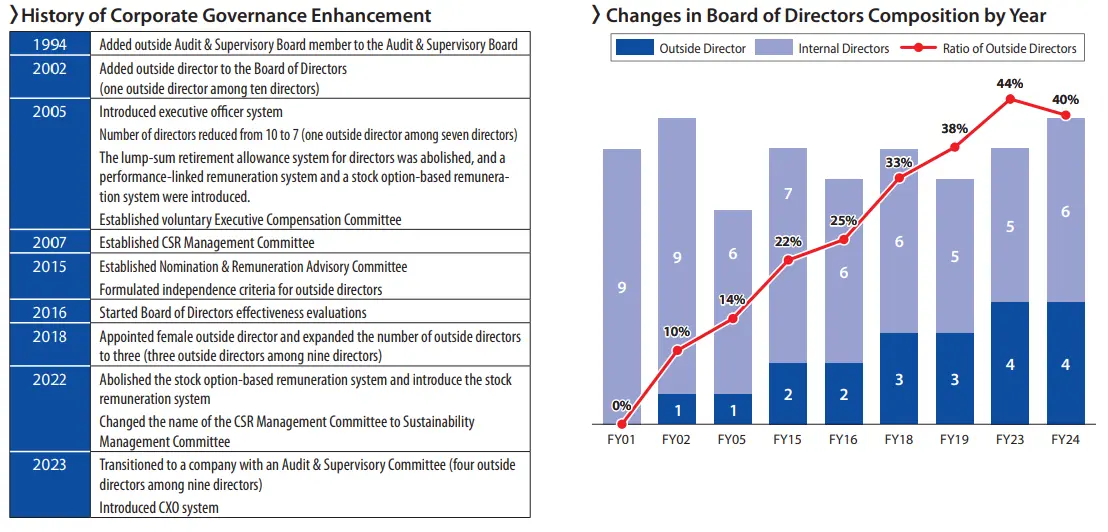
Corporate Governance Framework
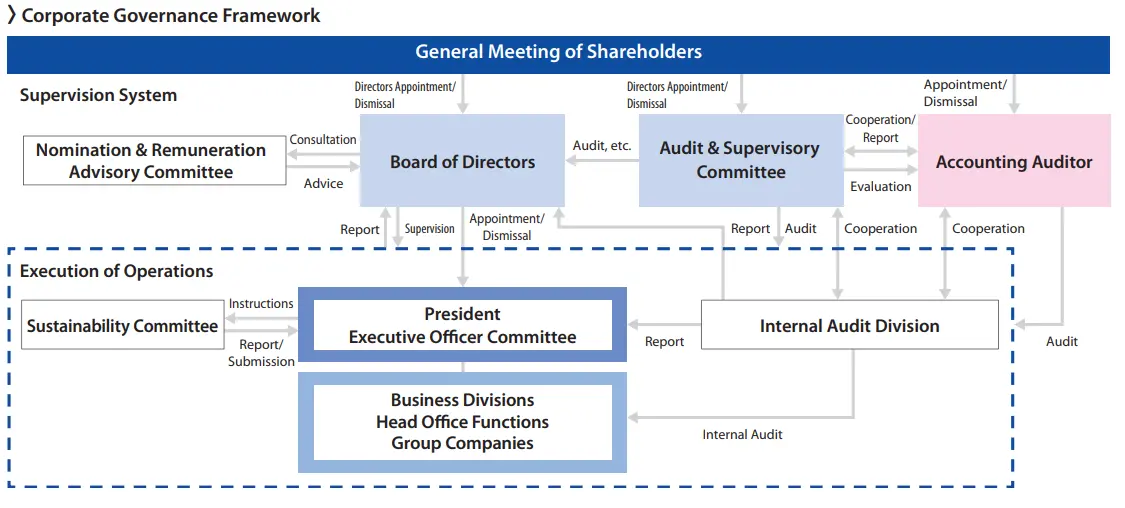
Board of Directors
The Board of Directors makes decisions on matters stipulated by laws and regulations and important management-related matters, and supervises the execution of duties by directors. The Board of Directors consists of ten members. Four of these directors are independent outside directors, accounting for more than one third of the Board of Directors. The company has established its own Independence Criteria for outside directors, available on its website. The company shall select such candidates of independent outside directors who meet our independence Criteria in addition to those set by the Companies Act and the Tokyo Stock Exchange. The Company holds Board of Directors meetings once a month, and extraordinary meetings of the Board of Directors are held as necessary. Outside directors and internal directors work to strengthen their relationships through occasional meetings and exchanges of opinions outside of Board of Directors meetings.
Chair:
Masahiro Asada, President
Conposition
5 directors (Masahiro Asada, Yusaku Hashiguchi, Shoichi Saito, Mitsutaka Nakamura, Yohei Tamura) and 5 directors who are Audit & Supervisory Committee members (Akira Kubota, Haruko Shibumura, Masashi Imamura, Akiko Toyoda, Yuji Yokoyama); total 10 directors.
Of these, Akira Kubota, Haruko Shibumura, Masashi Imamura, and Akiko Toyoda are independent outside directors.
Audit & Supervisory Committee
The Audit & Supervisory Committee makes decisions on audit policies, methods for auditing the status of operations and assets, and other matters related to the execution of duties by Audit & Supervisory Committee members, receives reports on important audit-related matters, and prepares audit reports. The Audit & Supervisory Board members may also make decisions on the selection and dismissal of full-time, selected, and specified Audit & Supervisory Committee Members, as well as on the content of proposals submitted to the General Meeting of Shareholders regarding the selection and dismissal of accounting auditors. In addition, the committee has the right to consent to the selection and remuneration of directors who are Audit & Supervisory Committee members, and the right to express opinions on the selection and remuneration of directors who are not Audit & Supervisory Committee members. In principle, the Audit & Supervisory Committee holds meetings once a month, and extraordinary meetings of the Audit & Supervisory Committee are held as necessary.
Chair:
Yuji Yokoyama, Audit & Supervisory Committee Member
Conposition
5 directors who are Audit & Supervisory Committee members (Akira Kubota, Haruko Shibumura, Masashi Imamura, Akiko Toyoda, Yuji Yokoyama)
Of these, Akira Kubota, Haruko Shibumura, Masashi Imamura, and Akiko Toyoda are independent outside directors.
Nomination & Remuneration Advisory Committee
With the objective of making fair and transparent decisions on the nomination and compensation of board members, etc. The company has established a Nomination & Remuneration Advisory Committee which holds meetings several times a year. The Committee conducts fair and transparent deliberations and reports to the Board of Directors on nominations for directors and executive officers and on compensation for directors (excluding directors who are Audit & Supervisory Committee members and outside directors), executive officers, trustees, advisors, and counselors.
Chair:
Akira Kubota, Lead Outside Director
Conposition
President, Masahiro Asada and 4 independent outside directors (Akira Kubota, Haruko Shibumura, Masashi Imamura, Akiko Toyoda); total 5 persons.
Executive Officer Committee
The Company has adopted an executive officer system to accelerate management decision-making and to build a system that contributes to the efficient execution of duties by directors. The Executive Officer Committee, within the scope of authority delegated by the Board of Directors, receives reports on the execution of important operations of the Tamura Group and makes decisions on important matters or decides on matters to be brought before the Board of Directors.
Chair:
President, Masahiro Asada
Conposition
Executive officers and persons appointed by the President
* "Executive officer" in the Company refers to the positions of president, executive vice president (EVP), and senior vice president (SVP).
Sustainability Committee
As a sub-organization to the Executive Officer Committee, the Sustainability Management Committee reports on sustainability overall, including compliance and CSR, to the Executive Officer Committee. Sustainability Committee meetings are held twice a year.
Chair:
President, Masahiro Asada
Conposition
Relevant executive officers, etc.
Nomination of Director Candidates
Nomination Policy and Procedures
The Board of Directors shall consist of at least one-third of outside directors, and strives to select persons who meet the independence standards set by the Tokyo Stock Exchange and the Company. In addition, by adopting an executive officer system, which separates execution and supervision, we ensure that the Board of Directors has an appropriate number of members to function. The appointment and dismissal of directors and executive officers is carefully deliberated by the Board of Directors after report from the Nomination & Remuneration Advisory Committee based on the standards for appointment and dismissal of directors and executive officers.
- Director Candidates (non Audit and Supervisory Committee member candidates)
The Company appoints candidates to the position of director who have the knowledge, experience, and qualifications to contribute to the fulfillment of the functions of the Board of Directors in consideration of the Company's business content, scale, management environment, etc., while taking into consideration the balance and diversity of the Board of Directors as a whole. The Nomination and Remuneration Advisory Committee recommends candidates based on the nomination standards for directors. The Board of Directors then carefully deliberates and decides whether to nominate the candidate.
- Director Candidates (Audit and Supervisory Committee member candidates)
Having the qualifications to contribute to improving the soundness and transparency of management by auditing the business execution status of Directors (excluding Audit and Supervisory Committee members) from a fair and objective standpoint, taking into account the Company's business content, scale, management environment, and auditing system, etc. in addition, candidates for Directors who are Audit and Supervisory Committee members are appointed personnel who have extensive knowledge and experience in business administration and business operations. The Nomination & Remuneration Advisory Committee recommends candidates based on the nomination standards for directors. After careful deliberation and resolution by the Board of Directors, a proposal is made to the Audit and Supervisory Committee and obtains its consent to make a decision.
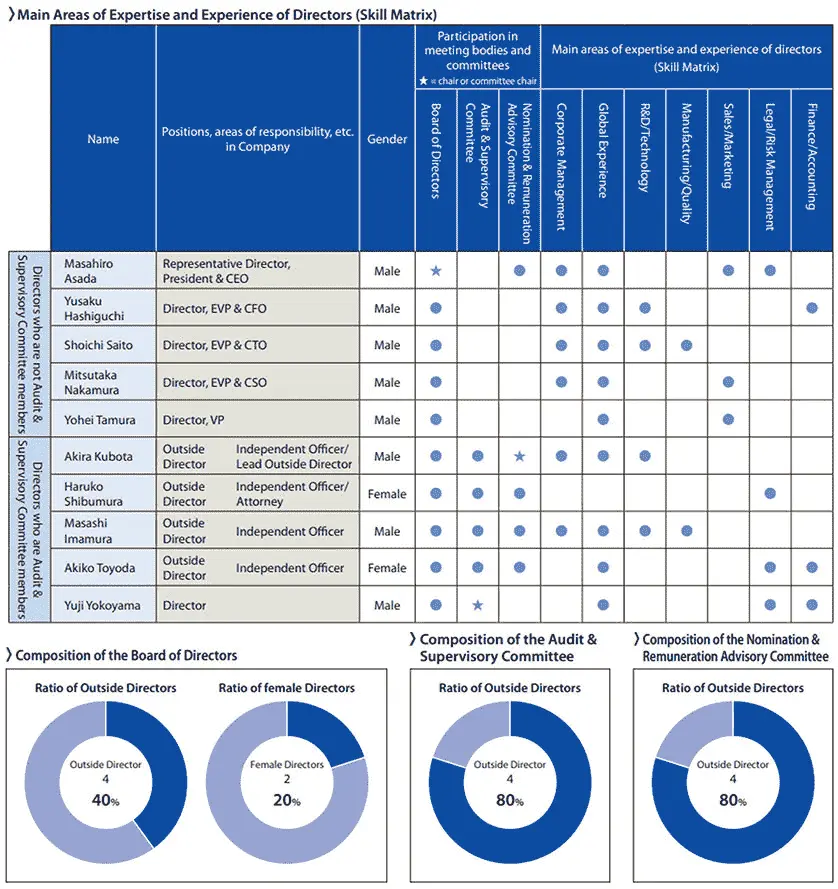
Effectiveness Evaluation of Board of Directors
Specific items considered by, and the status of activities of, the Board of Directors, the Audit & Supervisory Committee, and the Nomination & Remuneration Advisory Committee in FY2023 were as follows
Specific items considered by the Board of Directors
- Determination of fiscal year business plan and checking of progress of the Medium-term Management Plan
- Approval of financial documents
- Approval of capital investment and financing
- Approval of changes to the corporate governance structure, including the transition to the structure of a company with an Audit & Supervisory Committee
- Approval of key personnel and organizational changes, including officer candidates
- Approval of officer compensation
- Approval of key regulations
- Approval of sustainability-related matters, including information disclosure
Specific items considered by the Audit & Supervisory Committee
- Determination of auditing policy and methods of auditing the status of work and assets
- Receipt of reports on key matters related to audits
- Selection of full-time, selected, and specified Audit & Supervisory Committee members
- Determination of the content of proposals to be submitted to the General Meeting of Shareholders regarding the selection and dismissal of accounting auditors
Specific items considered by the Nomination & Remuneration Advisory Committee
- Deliberation on the selection of director candidates
- Deliberation on the selection of executive officer candidates
- Deliberation on compensation and bonuses for directors and executive officers
- Deliberation on the revision of the compensation system for directors and executive officers
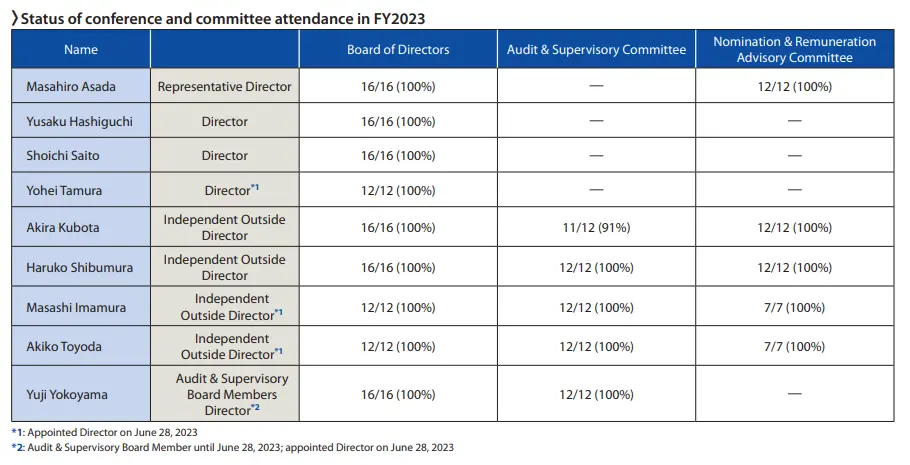
Effectiveness evaluation of the Board of Directors
As a component of efforts to further enhance the effectiveness of the Board of Directors, every year the board evaluates its effectiveness and releases a summary.
Analysis and evaluation method
For the fiscal year ended March 2024, the evaluation addressed the effectiveness of the first year of the Company's transition to the structure of a company with an Audit & Supervisory Committee. The effectiveness of the Board of Directors overall, including the Audit & Supervisory Committee and the Nomination & Remuneration Advisory Committee, was evaluated. We entrusted an external organization to conduct a survey of all directors through an anonymous questionnaire (separated by internal and outside directors) that employs a combination of multiple-choice and open-ended responses, followed by analysis and evaluation of the compiled responses. All directors received a report on the results of the survey and will discuss improvement measures.
Summary of effectiveness evaluation of the Board Meetings for the fiscal year ended March 2024
- Overview of questions
Composition, operation, discussions, and monitoring functions of the Board of Directors; performance of directors; support structure and training for directors; dialogs with shareholders (investors); the Audit & Supervisory Committee; the Nomination & Remuneration Advisory Committee; etc.
- Summary of effectiveness evaluation
Quantitative evaluation scores decreased, primarily for outside directors, due to factors including the replacement of multiple directors. However, directors continued to express many constructive and ambitious opinions, and the effectiveness of the Board of Directors overall was confirmed.
- Matters identified as issues
-
- Operation of the Board of Directors:
Opinions on time spent on meetings and deliberations vary, and a need exists to form a consensus - Deliberations by Board of Directors:
A need exists to enrich discussions on corporate value, capital efficiency, and Medium-term Management Plans - Performance of directors:
Resolution of disparities in level of information and participation in discussions between internal and outside directors
- Operation of the Board of Directors:
Past Effectiveness Evaluation Results and Countermeasures
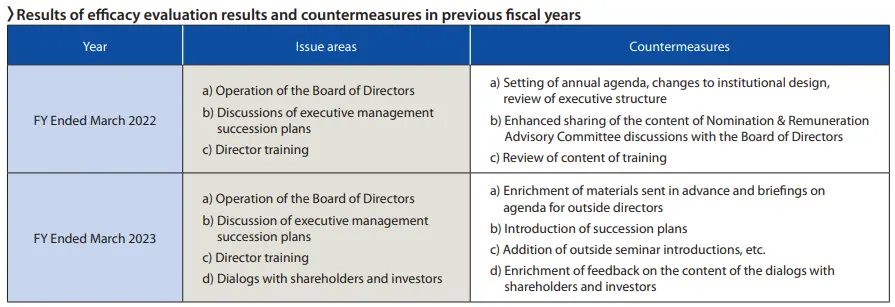
Compensation of Director Remuneration
Compensation of directors (excluding directors who are Audit & Supervisory Committee members and outside directors)
The Company has established a policy for determining the details of remuneration, etc. for individual directors (excluding directors who are Audit & Supervisory Board members and outside directors) in the Director Remuneration regulations. In order to ensure fairness and transparency, the Nomination & Remuneration Advisory Committee, chaired by the Lead Outside Director and composed of a majority of outside directors, reviews and reports on the policy, which is then decided by a resolution of the Board of Directors.
Remuneration for directors consists of monthly remuneration, performance-linked remuneration, and stock remuneration. The remuneration ratio by type is determined in a way that contributes to the provision of sound incentives for improving performance in each fiscal year and increasing corporate value over the medium to long term.

- 1Monthly Remuneration
Fixed remuneration for each individual director as stipulated in the director remuneration regulations
- 2Performance-linked Remuneration
Bonuses for directors (excluding directors who are Audit & Supervisory Committee members) are calculated according to the performance of the fiscal year in accordance with the procedures stipulated in the director evaluation regulations and director remuneration regulations. Sales, profit attributable to owners of parent, ROE, etc. have been selected as evaluation indicators. These evaluation indicators were selected from the viewpoints of evaluating the improvement of profitability and shareholder value.
◦ Calculation formula: Monthly remuneration x base months x ratio of remuneration by position according to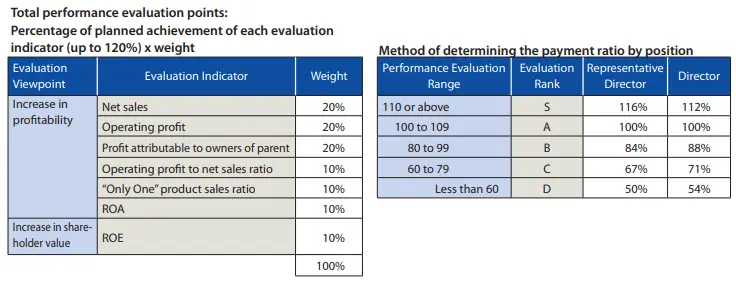
- 3Stock Remuneration
This scheme is a trust established by the Company through contributions of money (hereinafter “Trust”). The Company acquires the Company's shares, and the Company's shares equivalent to the number of points granted by the Company to the directors are delivered to the directors through the Trust. There are two types of points awarded under this Trust: Fixed points based on position, etc., and performance-linked points based on position, achievement of performance targets, etc.
In principle, directors will receive delivery of the Company's shares at time of retirement.
Compensation of directors who are Audit & Supervisory Committee members and outside directors
Compensation, etc. for directors who are Audit & Supervisory Committee members and outside directors is stipulated as monthly remuneration in the Audit & Supervisory Committee renumeration regulations. The monthly remuneration is determined through discussions among the Audit & Supervisory Committee members, taking into consideration directors' social positions, contributions to the Company, and circumstances of appointment.
Total Amount of Remuneration, etc. for Directors and Audit & Supervisory Committee Members (FY2023)
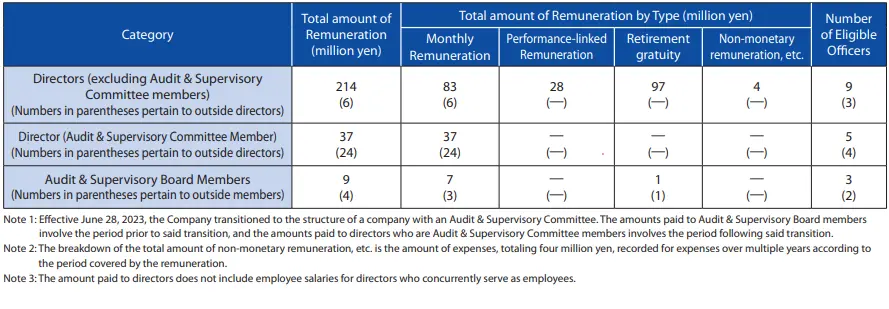
Strategically held shares
Holding policy
Our Company's policy is to reduce strategic shareholdings to 10% or less of consolidated net assets. However, the electronics industry, in which the Group operates, has a wide range of participants, from finished product manufacturers to parts suppliers, and it is essential for it to collaborate directly or indirectly with third parties in development, procurement, production, distribution, and sales of products. For this reason, the Company may hold certain strategic shares from a medium- to long-term perspective to improve corporate value, comprehensively considering business and alliance strategies. The Board of Directors conducts regular annual verification of the suitability of specific strategic shareholdings, comprehensively taking into consideration the business strategy of the Group and its business relationships with the issuers of the shares from a medium- to long-term perspective.
Method for verifying the rationality of shareholdings
The necessity of particular stock is reviewed in light of the above-mentioned purpose of holding and based on the three criteria: annual transaction value with the issuer; transaction trend for the last three years; and the value of holding against the value of transaction. The value of transaction is determined on a consolidated basis of an issuer.
Outcome of verification by the Board of Directors, etc. regarding the suitability of specific stockholdings as of the end of March 2024
The verification confirmed the achievement of objectives for the holding of all stocks for which it is possible to quantitatively measure annual transaction value with the issuer, the transaction trend for the last three years, and the value of holding against the value of transaction.
Exercise of voting rights
The voting rights related to strategically held shares shall be exercised for each agenda item, comprehensively considering whether the holding contributes to the improvement of the medium- to long-term corporate value of the issuer and whether it leads to the improvement of the medium- to long-term corporate value of the Company. The specific criteria are disclosed on the Group's website (Japanese only).
IR Communication
The timely and proper disclosure of company information in line with laws and regulations gives shareholders and investors anaccurate understanding of the Tamura Group and wins their trust.
Financial briefings for investors
Our financial statements are announced quarterly with its accounts for the full year ending March. At the announcement of the full year results (in May) and the announcement of the second quarter results (in November), the financial results briefing is held for analysts and institutional investors within a few days following the announcement, where the president and the senior management report the business results, the business prospect, etc. The written materials used there are posted on the Group's website without delay following the announcement. A questionnaire survey on the IR activity is also conducted at the financial results briefing and we make efforts to improve the method of information dissemination to the shareholders and investors.
Disclosure of investor information via our website
In order to provide information promptly and fairly, we have established an investor information section on our website to facilitate communication. Various materials, including annual and quarterly securities reports, financial statements, financial results briefing materials, and shareholder newsletters, are also posted promptly on our website after publication.
Click here to refer IR information.
Our Philosophy of Returning Profits to Shareholders
The Tamura Group, while working to increase corporate value through mid- and long-term management plans and reinforce financial strength by expanding operating revenue and securing internal reserves, shall continue to make efforts to further stabilize and improve the dividend level based on the recognition that returning profits to shareholders is its top priority.
Basic Policy for Internal Control Systems
The Tamura Group's internal control system aims to stabilize and improve efficiency of management, ensure appropriate accountability, and comply with laws, regulations, and internal rules. In order to achieve appropriate business management, the following systems, including risk management, compliance, and internal audit processes, have been established.
- 1System for maintaining and managing information related to the execution of duties by the Directors of the Company and a system for reporting matters related to the execution of duties by directors of Group companies to the Company
- 1Based on the Information Management Rules, the Company and the Group companies maintain and manage information related to the execution of duties by their directors. Each has established a system equipped with search functions that allows easy and timely access to information, taking all possible measures to maintain confidentiality according to the storage medium.
- 2related to the execution of duties by their directors. Each has established a system equipped with search functions that allows easy and timely access to information, taking all possible measures to maintain confidentiality according to the storage medium.
- 2Rules and other systems regarding the management of the risk of incurring losses
In order to manage the risk of incurring losses, the Group has established the Risk Management and Crisis Management Rules as a system to promptly inform the management of any circumstance that could pose a risk of losses to the Group. The system has been communicated and rolled out across the Group.
Should there be a serious crisis, a system has been established that the management could take appropriate actions to minimize risks to the Group, such as by having the President take direct command as the head of the crisis headquarters. - 3System to ensure efficient execution of duties by Directors at each Group company
- 1The Company's Board of Directors meets regularly once a month and as needed, in order to ensure that the duties of the Directors are executed efficiently, deciding on important management matters stipulated by law and internal rules, and receiving reports from the Directors and Executive Officers in charge. At the same time, the Board of Directors supervises the efficient execution of duties by individual Directors.
- 2The Company has adopted an Executive Officer system to speed up management decision-making and contribute to the efficiency of the execution of duties by Directors. The Executive Committee within the executive authority delegated by the Board, makes decisions or receives reports on important matters of the Group, including those to be reported or decided by the Board of Directors.
- 3The Internal Audit Department of the Company conducts audits of each Group company based on the Internal Audit Rules and reports the results and matters to be improved to the President and the Board of Directors.
- 4The board of directors of Group companies meet regularly to determine their basic management policies and supervise the execution of duties by their directors, as well as the important matters of their subsidiaries, if any.
- 4System to ensure that the execution of duties by directors and employees of each Group company complies with laws and regulations and the articles of incorporation
- 1Based on the Ethics and Legal Compliance Rules established in accordance with the Group's corporate philosophy consisting of the Mission, Vision and Guidelines, the Group has a system in place to ensure that all of its directors, officers and employees shall comply with laws and regulations, social norms and ethics, and each company's articles of incorporation and internal rules. In addition, based on the Sustainability Organization Rules, the Group has established the Sustainability Management Committee, which shall promote actions related to sustainability, including compliance, as well as build, maintain and improve an internal control system. Furthermore, the Group has established a whistleblowing system for Group employees to report or consult regarding illegal or potentially illegal acts that may occur in the course of business, so that the management could respond in a timely manner in order to secure the legality of the actions of directors and employees. There are two contacts to choose: an internal contact operated by a team of employees in the Group; and an independent contact operated by Members of the Audit and Supervisory Committee, who are not part of the Group's executive team.
- 2The Internal Audit Department conducts audit on accounting, business, compliance, information system, and other specific matters based on the Internal Audit Rules and evaluates the internal control system based on the Internal Control Basic Rules.
- 3When a Director finds a serious compliance violation such as those stipulated in the Ethics and Legal Compliance Rules, they shall immediately report it to the Board of Directors and the Audit and Supervisory Committee in accordance with the above-mentioned Alarm Escalation Rules.
- 4The Audit and Supervisory Committee may request Directors and Executive Officers in charge of relevant areas of responsibility to formulate improvement measures when they find any problem regarding the operation of the Group's compliance system.
- 5System to ensure the appropriateness of operations in the Group
- 1In order to ensure the appropriateness of operations, the Group has established the corporate philosophy, consisting of the Mission, Vision and Guidelines, as well as the Tamura Group Code of Conduct based on them, which apply to and have been communicated to all the Group companies.
- 2Based on the belief that its suppliers should understand the Group's corporate philosophy in order to ensure the appropriateness of its operations, the Group has summarized them in the Tamura Group Procurement Guidelines.
- 3The Director in charge of each Group company shall report or submit for approval to the Board of Directors of the Company regarding important matters on a regular or timely basis in accordance with the Group Company Management Rules.
- 4The Company ensures the proper performance of business, by allowing its Directors to concurrently serve as directors of Group companies, as necessary. At the same time, such concurrent serving of Directors enables them to find and report important compliance issues at a Group company and report them in a timely manner based on the Alarm Escalation Rules and to the Board of Directors and the Audit and Supervisory Board.
- 5If a Group company determines that there is a compliance issue in the Company's control or guidance on such Group company's business management, it shall immediately report it based on the Alarm Escalation Rules and to the Board of Directors and the Audit and Supervisory Committee.
- 6The Internal Audit Department of the Company, in cooperation with the Audit and Supervisory Committee, regularly conducts audits of each Group company.
- 6Matters concerning the system regarding employees who should assist the duties of Audit and Supervisory Committee and the independence of such employees from Directors (excluding directors who are Audit and Supervisory Committee members)
- 1If the Audit and Supervisory Committee requires employees to assist in their duties, the Board of Directors must appoint such personnel. In order to ensure the independence and neutrality of the duties of such personnel, the selection, dismissal, personnel changes, wages and other matters regarding them shall not be decided by the Board of Directors without the consent of the Audit and Supervisory Committee. In addition, the Audit and Supervisory Committee shall independently evaluate such personnel.
- 2Such personnel are given instructions by the Audit and Supervisory Committee.
- 7The system for reporting to the Audit and Supervisory Committee, including reports by directors (excluding directors who are Audit and Supervisory Committee members), officers and employees of Group companies and the system for ensuring effective audits by the Audit and Supervisory Committee
- 1The Risk Management and Crisis Management Rules have been established so that directors (excluding directors who are Audit and Supervisory Committee members) and employees of the Group companies should promptly report such important matters as affect their business or business performance to the Audit and Supervisory Committee.
- 2The Group makes sure that those who make report to the Audit and Supervisory Committee, or whistleblowers should not be treated unfairly, and such policy has been communicated across the Group.
- 3The Company has appointed those who have sufficient knowledge of finance and legal affairs related to corporate activities as Outside Members of the Audit and Supervisory Committee so that they could carry out appropriate and effective audit in cooperation with the Internal Audit Department.
- 4Expenses to be incurred in the performance of the duties of Audit and Supervisory Committee are budgeted every fiscal year and expenses incurred, including both budgeted and unbudgeted, are borne by the Company.
- 8System to ensure the appropriateness of financial reporting
Regarding internal control related to financial reporting, the Company thoroughly collects important information and disclose it in a timely and appropriate manner in order to ensure compliance with the Financial Instruments and Exchange Act and the other related laws and regulations and the rules of the Tokyo Stock Exchange.
The Company has established necessary information disclosure system, the rules on internal control regarding information and its communications and monitoring and relevant information systems.
June 28, 2023
